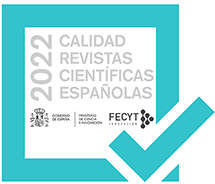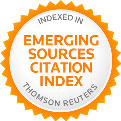Propiedades psicométricas de un cuestionario para la evaluación del conocimiento procedimental en voleibol (CCPV). Psychometric properties of Procedural Knowledge Questionnaire in Volleyball (PKQV).
Resumen
El objetivo de este estudio fue analizar las propiedades psicométricas de un cuestionario para la evaluación del conocimiento procedimental en el deporte. La muestra de esta investigación fue de 489 sujetos, de edades comprendidas entre los 13 y los 16 años, con diferentes contextos de práctica deportiva, años de experiencia y género. Los resultados obtenidos demostraron que el instrumento posee una validez y consistencia interna evidentes, hallándose un modelo factorial compuesto por un factor principal (conocimiento procedimental) y dos factores secundarios (pensar y comprender), con pesos factoriales adecuados, siendo muy elevados entre los factores secundarios y el factor principal. Igualmente, es interesante destacar que uno de los ítems fue eliminado del cuestionario inicial, al poseer un peso factorial muy bajo. El análisis de la validez de contenido y de la validez concurrente reforzaron positivamente los resultados obtenidos. Por ello, se puede concluir diciendo que el cuestionario planteado es un instrumento adecuado para su utilización en el contexto deportivo, aunque una mayor profundidad en el estudio de este constructo puede ser favorable para continuar aportando nuevas averiguaciones.
Abstract
The purpose of this study was to examine the psychometric properties of a questionnaire to evaluate the procedural knowledge in sport. The sample of this investigation was 489 subjects, of 13 to 16 years old, with different contexts of sports practice, experience and gender. The results revealed satisfactory validity and internal consistency of the instrument, obtaining a factorial model made up a main factor (procedural knowledge) and two subscales (thinking and understanding), with suitable factor loadings, being very high between main factor and two subscales. Equally, it is interesting to emphasize that one of the items was eliminated of the initial questionnaire, so the factor loading was very low. The analysis of the content and concurrent validity reinforced these results. So, it is possible to conclude saying that this questionnaire is an instrument adapted for its utilization in the sports context. To make a careful study of this construct can be favourable to continue contributing new inquiries.
http://dx.doi.org/10.5232/ricyde2013.03103
---------------------------------------------------------------------
Referencias/references
Blomqvist, M.; Vänttinen, T., & Luhtanen, P. (2005). Assessment of secondary school students´ decision-making and game-play ability in soccer. Physical Education and Sport Pedagogy, 10(2), 107-119.
http://dx.doi.org/10.1080/17408980500104992
Bollen, K. A. (1989). Structural equations with latent variables. New York: Wiley.
PMCid:1133599
Cox, T.; Oliver, A.; Rial-González, E.; Tomás, J. M.; Griffiths, A., & Thompson, L. (2006). The Development of a Spanish Language Version of the Worn Out Scale of the General Well-Being Questionnaire (GWBQ). The Spanish Journal of Psychology, 9(1), 94-102.
PMid:16673627
Del Villar, F.; García, L.; Iglesias, D.; Moreno, M. P., & Cervelló, E. M. (2007). Expert-novice differences in cognitive and execution skills during tennis competition. Perceptual and Motor Skills, 104, 355-365.
http://dx.doi.org/10.2466/pms.104.2.355-365
PMid:17566424
Elferink-Gemser, M. T.; Visscher, C.; Richart, H., & Lemmink, K. A. P. M. (2004). Development of the Tactical Skills Inventory for Sports. Perceptual and Motor Skills, 99, 883-895.
http://dx.doi.org/10.2466/pms.99.3.883-895
PMid:15648483
Flora, D. B., & Curran, P. J. (2004). An empirical evaluation of alternative methods of estimation for confirmatory factor analysis with ordinal data. Psychological Methods, 9, 466–491.
http://dx.doi.org/10.1037/1082-989X.9.4.466
PMid:15598100 PMCid:3153362
García, L.; Moreno, M. P.; Moreno, A.; Iglesias, D., y Del Villar, F. (2009). Estudio de la relación entre conocimiento y toma de decisiones en jugadores de tenis, y su influencia en la pericia deportiva. RICYDE. Revista Internacional de Ciencias del Deporte, 5(17), 60-75. http://dx.doi.org/10.5232/ricyde2009.01705
Gil, A.; Moreno, M. P.; Moreno A.; García-González, L., y Del Villar, F. (2011). La práctica federada como elemento de desarrollo del conocimiento: aplicación al voleibol de formación. RICYDE. Revista Internacional de Ciencias del Deporte, 7(24), 230-244.
http://dx.doi.org/10.5232/ricyde2011.02406
Hu, L., & Bentler, P.M. (1999). Cut off criteria for fit indexes in covariance structure analysis: Conventional criteria versus new alternatives. Structural Equation Modeling, 6, 1–55.
http://dx.doi.org/10.1080/10705519909540118
McPherson, S. L. (1994). The development of sport expertise: Mapping the tactical domain. Quest, 46, 223-240.
http://dx.doi.org/10.1080/00336297.1994.10484123
McPherson, S. L. (1999). Expert-novice differences in performance skills and problem representations of youth and adults during tennis competition. Research Quarterly for Exercise and Sport, 70, 233-251.
PMid:10522282
McPherson, S. L., & Kernodle, M. W. (2007). Mapping two new points on the tennis expertise continuum: Tactical skills of adult advanced beginners and entry-level professionals during competition. Journal of Sports Sciences, 25(8), 945-959.
http://dx.doi.org/10.1080/02640410600908035
PMid:17474048
McPherson, S. L., & Thomas, J. R. (1989). Relation of knowledge and performance in boys´ tennis: age and expertise. Journal of Experimental Child Psychology, 48, 190-211.
http://dx.doi.org/10.1016/0022-0965(89)90002-7
Nadeau, L.; Godbout, P., & Richard, J. F. (2008). Assessment of ice hockey performance in real-game conditions. European Journal of Sport Science, 8(6), 379-388.
http://dx.doi.org/10.1080/17461390802284456
Nielsen, T.M., & McPherson, S.L. (2001). Response selection and execution skills of professionals and novices during singles tennis competition. Perceptual and Motor Skills, 93, 541-555.
PMid:11769911
Pritchard, T.; Hawkins, A.; Wiegand, R., & Metzler, J. N. (2008). Effects of two instructional approaches on skill development, knowledge, and game performance. Measurement in Physical Education and Exercise Science, 12(4), 219-236.
http://dx.doi.org/10.1080/10913670802349774
Särndal, C. E.; Swensson, B., & Wretman, J. H. (1992). Model assisted survery sampling. Springer series in statistics. New York.
http://dx.doi.org/10.1007/978-1-4612-4378-6
Turner, A., & Martinek, T. J. (1999). An investigation into teaching games for understanding: Effects on skill, knowledge, and game play. Research Quarterly for Exercise and Sport, 70, 286-296.
PMid:10522286
Willet, J., B, & Sayer, A. G. (1994). Using covariance structure analysis to detect correlates and predictors of individual change over time, Psychological Bulletin, 116: 363-381.
http://dx.doi.org/10.1037/0033-2909.116.2.363
Williams, A. M., & Ericsson, K. A. (2005). Some considerations when applying the expert performance approach in sport. Human Movement Science, 24, 283-307.
http://dx.doi.org/10.1016/j.humov.2005.06.002
PMid:16095739
Palabras clave/key words
Texto completo/Full Text:
PDF------------------------ 0 -------------------------
RICYDE. Revista Internacional de Ciencias del Deporte
![]()

Publisher: Ramón Cantó Alcaraz
ISSN:1885-3137 - Periodicidad Trimestral / Quarterly

